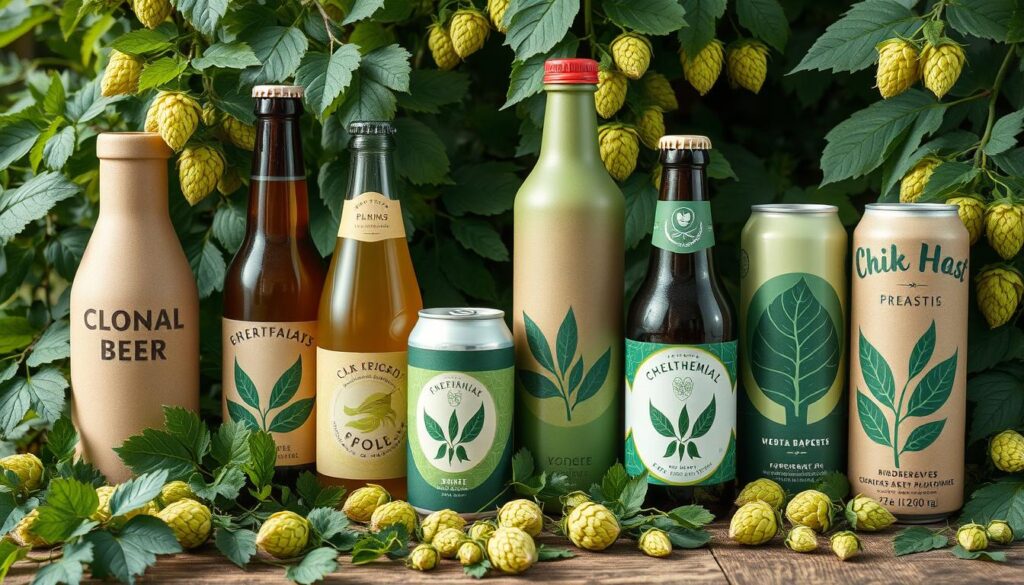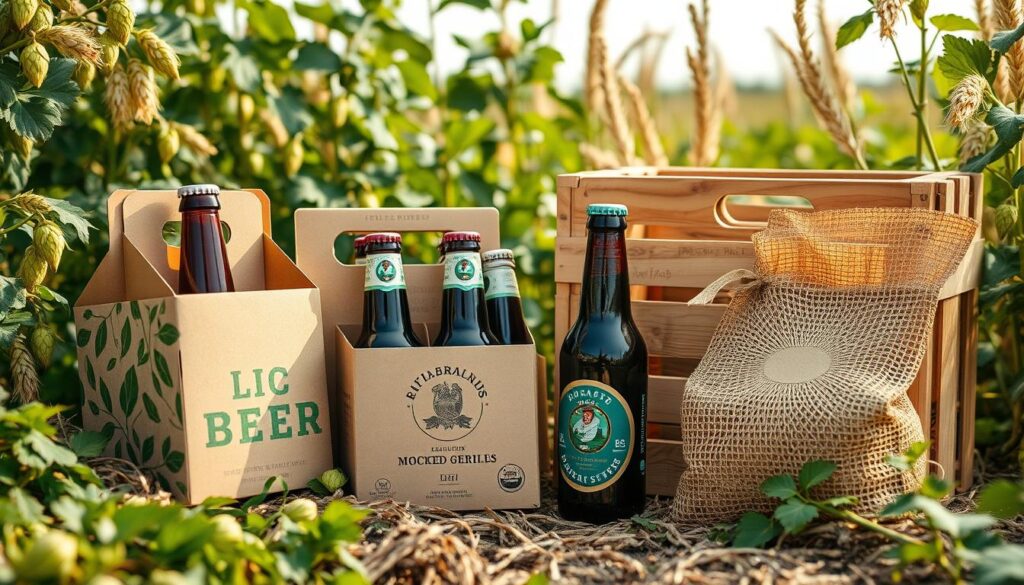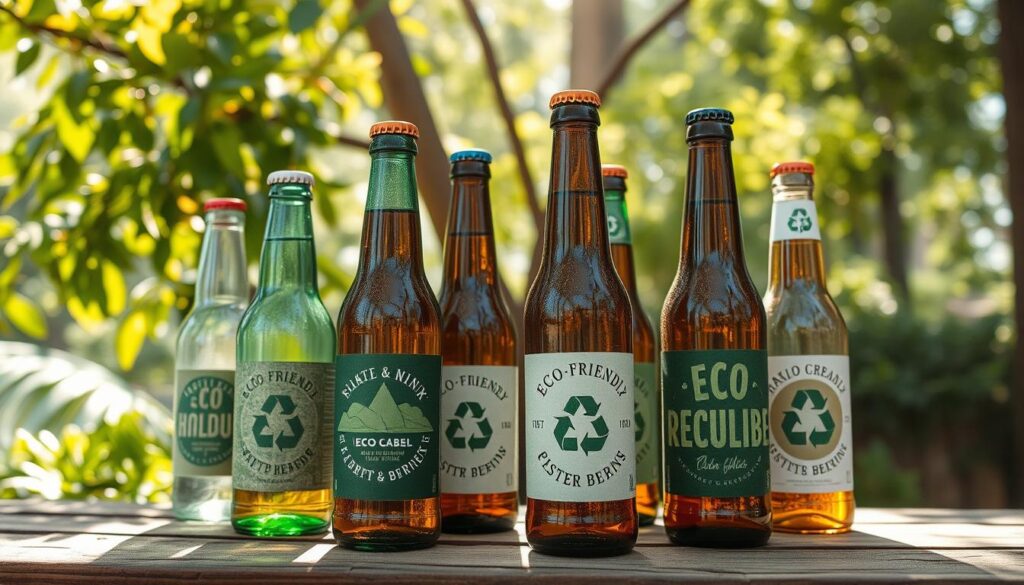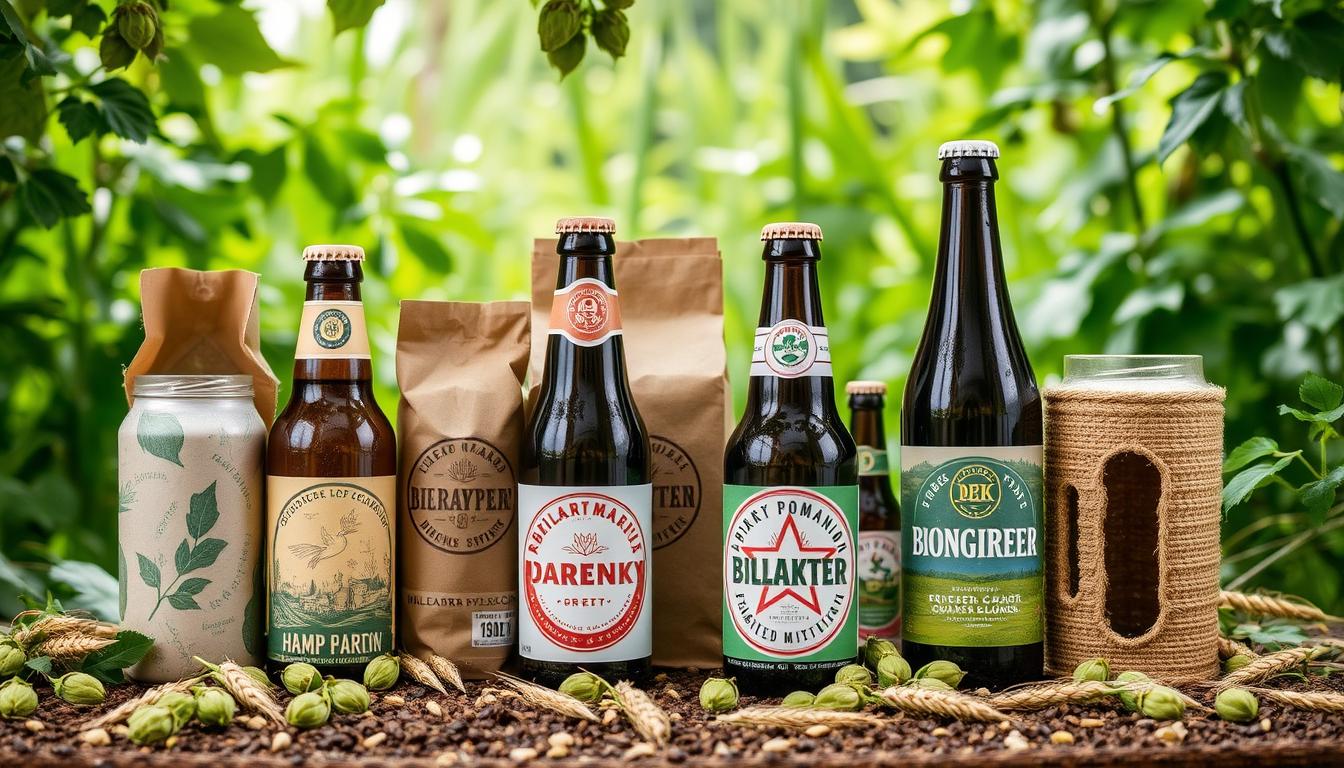Breweries are now seeking eco-friendly beer containers to reduce their environmental impact. This shift is timely, as only one-third of U.S. waste is recycled or composted. The Environmental Protection Agency (EPA) reports this concerning statistic.
Flying Tiger Brewery in Louisiana is pioneering sustainable packaging. They’re using biodegradable, compostable, and edible rings made from wheat and barley. These are the same grains used in brewing beer.
The brewery’s eco-friendly efforts extend beyond materials. They’ve pledged 5% of sales from their Doux Drop wheat ale to wildlife conservation. This ale is packaged with biodegradable rings.
Flying Tiger Brewery has made eco-friendly packaging standard practice. Corona and Guinness have only tested biodegradable rings in limited runs. The 2019 designation of Queen Bess Island as a wildlife refuge inspired this move.
Innovation is crucial for sustainable beer packaging. Breweries can use reusable kegs, aluminum cans, and glass bottles. These options help reduce environmental impact while maintaining product quality.
The Rise of Sustainable Beer Packaging
The beer industry is shifting towards sustainable practices. Environmental concerns and consumer demands are driving this change. Breweries are now adopting green beer packaging innovations.
Environmental Regulations and Consumer Demands
Stricter regulations and eco-conscious consumers are reshaping beer packaging. Many breweries are exploring alternatives to traditional packaging methods. Locavore Beer Works now uses removable labels on its cans to improve recycling.
UN’s Goal 12: Responsible Consumption and Production
Breweries are aligning with UN sustainability goals through responsible production. Witch’s Hat brewery in Michigan composts all food waste and brewery byproducts. They’ve also adopted Eco Six Pack Rings (E6PR) instead of plastic rings.
Long-term Cost Savings and Brand Image Benefits
Sustainable packaging often has higher upfront costs but offers long-term benefits. Jersey Girl Brewing partners with PakTech to encourage customers to return used package handles. This practice reduces landfill waste and enhances their brand image.
| Packaging Type | Environmental Impact | Cost Implications |
|---|---|---|
| Reusable Beer Bottles | 69 times less carbon emissions than single-use | Cost-effective after 20-25 uses |
| Aluminum Cans | Highly recyclable | Increased adoption in industry |
| E6PR Rings | Biodegradable alternative to plastic | Higher initial cost |

The shift to sustainable packaging presents challenges for breweries. Small breweries like Horse & Dragon Brewing face higher costs per can. However, the long-term benefits are clear for both the environment and brand loyalty.
Types of Eco-Friendly Beer Packaging Materials
The brewing industry is moving towards eco-friendly packaging options. Innovative solutions are changing how we package our favorite beers. Let’s explore some sustainable materials used in beer packaging.

Recyclable beer cans are leading in sustainable packaging. Aluminum can be recycled infinitely without losing quality. This creates a closed-loop system and reduces carbon emissions significantly.
Recycling aluminum can cut greenhouse gas emissions by up to 95%. This is compared to producing new cans from raw materials.
Eco-friendly beer bottles, especially glass ones, are still popular. Glass can be recycled repeatedly without degrading. Some breweries now offer refillable bottle programs to reduce waste even further.
Biodegradable materials are gaining popularity in beer packaging. E6PR’s compostable six-pack rings are made from agricultural byproducts. About 300 beverage producers across 25 countries now use these rings.
This shift away from plastic rings helps protect marine life. It’s a significant step towards more sustainable packaging in the beer industry.
| Packaging Material | Recyclability | Environmental Impact |
|---|---|---|
| Aluminum Cans | Infinitely recyclable | Low carbon footprint |
| Glass Bottles | Highly recyclable | Energy-intensive production |
| Biodegradable Rings | Compostable | Minimal environmental impact |
Sustainable beer packaging is both environmentally responsible and economically viable. A study found that consumers will pay more for sustainably packaged beer. On average, people are willing to spend $1.30 extra per six-pack.
This consumer support drives innovation in eco-friendly packaging. It encourages breweries to adopt more sustainable solutions for their products.
Reusable Kegs: A Sustainable Solution for Large-Scale Distribution
Reusable kegs are leading the charge in sustainable beer distribution. These eco-friendly containers are revolutionizing how breweries package and transport their products. Let’s explore two main types of reusable beer packaging materials making waves in the industry.
Stainless Steel Kegs: Durability and Reusability
Stainless steel kegs are the workhorses of sustainable beer distribution. They’re incredibly durable and can be reused hundreds of times. This longevity reduces the need for new materials and minimizes waste.
Reusable kegs emit 80-90% less CO2 throughout their lifecycle compared to single-use alternatives. This significant reduction in emissions makes them a top choice for eco-conscious breweries.

Recyclable Plastic Kegs: Lightweight and Eco-Friendly
Recyclable plastic kegs offer an excellent solution for breweries looking to lighten their load. These kegs are much lighter than stainless steel, making them easier to transport. They don’t compromise on sustainability despite their lightweight nature.
When plastic kegs reach the end of their useful life, they can be fully recycled. This further reduces their environmental impact and supports circular economy principles.
Both stainless steel and recyclable plastic kegs play crucial roles in sustainable beer distribution. They align with the UN’s Goal 12 for responsible consumption and production. These kegs help breweries reduce waste, save energy, and minimize non-recyclable materials.
By adopting reusable beer packaging materials, breweries can lower their carbon footprint. This sustainable approach maintains high standards of quality and productivity in the beer industry.
Aluminum Cans: Infinitely Recyclable and Lightweight
Recyclable beer cans are changing the beverage industry. These lightweight options benefit breweries and consumers. Aluminum cans can be recycled endlessly, keeping their original properties.
Aluminum cans are incredibly sustainable. Amazingly, 75% of all aluminum ever made is still in use today. A used can can be recycled and back on shelves within 60 days.

Aluminum cans are great at preserving beer quality. They shield beer from light, oxygen, and UV rays, maintaining its intended flavor. Their lightweight nature reduces transportation costs and carbon footprint.
| Feature | Benefit |
|---|---|
| Recyclability | 92.6% closed-loop circularity rate |
| Energy Efficiency | 95% less energy to produce from recycled material |
| Printability | Nearly 100% of can surface is printable |
| Versatility | Various shapes and sizes available |
Aluminum cans have a lower environmental impact than other packaging. A 2020 study found glass bottles had the biggest carbon footprint. A glass bottle needs three uses to match an aluminum can’s emissions.
Glass Bottles: Traditional Yet Recyclable
Glass bottles blend tradition with eco-friendly practices in beer packaging. These sustainable containers appeal to both brewers and consumers. They offer an environmentally responsible choice for beer lovers.

Preserving Beer Quality and Flavor
Glass keeps beer fresh and tasty. Its inert nature prevents unwanted flavors from affecting the brew. Craft brewers and enthusiasts prefer glass for maintaining authentic taste experiences.
Recycling and Reusing Glass Bottles
Glass bottles stand out in sustainable beer packaging. They can be recycled indefinitely without losing quality. Currently, 31% of glass bottles are recycled in the US.
Returnable glass bottles are gaining popularity. The market for these bottles is expected to grow significantly by 2032. This trend shows a shift towards eco-conscious consumption habits.
Recycling glass bottles saves resources and reduces pollution. Over a billion bottles have been recycled since 2009. These recycled bottles find new uses in containers, construction, and art projects.
Choosing recyclable beer packaging helps reduce our environmental impact. It’s an easy way to support sustainability in the beer industry. By picking glass, we contribute to a greener future while enjoying our favorite brews.
Innovative Biodegradable Packaging Solutions
The beer industry is making a big shift towards eco-friendly packaging. Biodegradable carriers and zero-waste solutions are now popular choices. These options help fight plastic pollution and protect wildlife.
Edible Six-Pack Rings: A Game-Changer in Beer Packaging
Edible six-pack rings are changing how we package beer. They’re made from natural materials like wheat and barley. This makes them safe for marine life to eat.
These rings tackle a big problem. About 91% of plastic packaging ends up in nature or landfills.

E6PR: Eco Six Pack Ring Technology
E6PR technology takes biodegradable beer carriers further. These rings are 100% bio-based and compostable. They’re made from leftover farm products.
E6PR rings break down naturally without hurting wildlife. They offer a green option to replace plastic packaging.
Zero-waste beer packaging has a big impact. Carlsberg’s Snap Pack cuts plastic use by up to 76%. This could reduce plastic packaging by over 1,200 tonnes each year.
| Packaging Solution | Environmental Impact |
|---|---|
| E6PR Eco Rings | 100% bio-based and compostable |
| Carlsberg’s Snap Pack | Up to 76% reduction in plastic usage |
| Trebodur Mabeerial | Biodegradable and compostable |
Sustainable Beer Packaging: Comparing Options
Eco-friendly beer packaging options balance environmental impact with practicality. The beer industry faces challenges in choosing sustainable packaging solutions.
Recyclable vs. Photodegradable vs. Compostable vs. Biodegradable
Recyclable options include Hi-Cone rings, made from 50% post-consumer recycled LDPE plastic. PakTech handles, made from 100% recycled material, are popular in U.S. craft beverages.
Ecogrip carriers use recycled Australian plastic with carbon-free ink for proper sorting. Compostable alternatives like E6PR (Eco Six Pack Rings) are made from plant fiber.
Whaler’s Brewing in Rhode Island uses E6PR for automated application. These biodegradable options offer a direct path from disposal to degradation.
| Packaging Type | Material | Environmental Impact |
|---|---|---|
| Hi-Cone Rings | 50% recycled LDPE | Recyclable |
| PakTech Handles | 100% recycled plastic | Recyclable |
| E6PR Rings | Plant fiber | Compostable, Biodegradable |
Challenges in Recycling Infrastructure
Recycling rates remain low despite efforts to create recyclable packaging. Only 9% of plastic produced since 1950 has been recycled.
In the U.S., each person generates 234 pounds of plastic waste annually. Less than 5% of plastic can rings are recycled into new products.

Some breweries have adopted paperboard-based packaging or compostable alternatives. These eco-friendly options aim to reduce plastic use and improve sustainability in the industry.
Eco-Friendly Packaging Equipment for Breweries
Sustainable brewing equipment and eco-friendly beer packaging are on the rise. Big Rock Brewery’s switch to biodegradable “Earthrings” packaging is a great example. This change will keep 23,529 kg of waste out of landfills each year.
The brewery spent about half its budget on special North American-made equipment. This shows their strong commitment to eco-friendly practices.
Impak Packaging leads the field with smart solutions for Canadian breweries. Their Bundle Wrappers and Case Packers can handle 40-60 cases per hour. Larger operations can scale up to 100+ cases.
These machines use materials with up to 30% recycled content. This aligns with eco-friendly trends in the industry. Impak also provides CRYOVAC® shrink film for secure transport packaging.
Small breweries and homebrewers can be eco-friendly too. Homebrewing uses less energy with its small batches. Reusing bottles and culturing yeast at home are simple green practices.
Cleaning water conservation is another easy way to be eco-friendly. These methods, along with advanced packaging gear, are creating a greener brewing future.

